|
|
|
Sort Order |
|
|
|
Items / Page
|
|
|
|
|
|
|
| Srl | Item |
| 1 |
ID:
044947
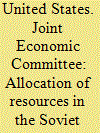

|
|
|
|
|
| Publication |
Wshington, U.S.Gopvernment Printing Office, 1977.
|
| Description |
vii,193p.
|
|
|
|
|
|
|
|
|
|
|
|
Copies: C:1/I:0,R:0,Q:0
Circulation
| Accession# | Call# | Current Location | Status | Policy | Location |
| 020274 | 337.47/US 020274 | Main | On Shelf | General | |
|
|
|
|
| 2 |
ID:
131857
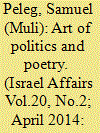

|
|
|
|
|
| Publication |
2014.
|
| Summary/Abstract |
The article demonstrates the potency and volatility of political lyricism by comparing two masters of the trade, the French Jacques Prevert and the Israeli Aryeh Sivan. Although writing in two dissimilar cultures and witnessing disparate political environments, the poetry of Prevert and Sivan is similar in many ways. They are both keen observers of their societies' woes and both are equally critical. Their accounts are s are emphatic and caring and strewn in their passionate, affectionate and brutally honest verses, Prevert and Sivan are the quintessential models for contemporary political poetry. Both poets, despite their disparate cultures and dissimilar local experiences, painstakingly probe and penetrate the political realities around them with velvet nails
|
|
|
|
|
|
|
|
|
|
|
|
|
|
|
|
| 3 |
ID:
091255
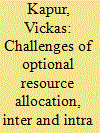

|
|
|
|
|
| Publication |
2009.
|
| Summary/Abstract |
India occupies an important geo-strategic location in the Indian Ocean. Her regional influence extends in an outer arc from the Eastern littoral of Africa and the Persian Gulf to South East Asia and the Indonesian archipelago and she harbours aspirations of being a global player.
|
|
|
|
|
|
|
|
|
|
|
|
|
|
|
|
| 4 |
ID:
031110
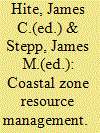

|
|
|
|
|
| Publication |
New York, Praeger Publishers, 1971.
|
| Description |
xxii, 169pHbk
|
| Series |
Praeger special studies in U.S. economic and social development
|
|
|
|
|
|
|
|
|
|
|
|
Copies: C:1/I:0,R:0,Q:0
Circulation
| Accession# | Call# | Current Location | Status | Policy | Location |
| 008127 | 658.152/HIT 008127 | Main | On Shelf | General | |
|
|
|
|
| 5 |
ID:
043464


|
|
|
|
|
| Publication |
New Jersey, Prentice-Hall, Inc, 1967.
|
| Description |
xiii, 385p.
|
|
|
|
|
|
|
|
|
|
|
|
Copies: C:1/I:0,R:0,Q:0
Circulation
| Accession# | Call# | Current Location | Status | Policy | Location |
| 003140 | 355/ENK 003140 | Main | On Shelf | General | |
|
|
|
|
| 6 |
ID:
091259
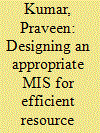

|
|
|
|
|
| Publication |
2009.
|
| Summary/Abstract |
The defence accounts department has been a pioneer in using automated system since 1931 and even today has a very good automated budgeting and accounting system. However, there are certain gaps in the over all Defence Budgeting and expenditure control mechanism which makes it lacking of reliable and timely receipt and expenditure data for budget planning, monitoring, expenditure control, and reporting.
|
|
|
|
|
|
|
|
|
|
|
|
|
|
|
|
| 7 |
ID:
041512


|
|
|
|
|
| Publication |
London, Macmillan and co. Ltd., 1971.
|
| Description |
ix, 261p.Hbk
|
| Standard Number |
333091310
|
|
|
|
|
|
|
|
|
|
|
|
Copies: C:1/I:0,R:0,Q:0
Circulation
| Accession# | Call# | Current Location | Status | Policy | Location |
| 007022 | 658.1/GRI 007022 | Main | On Shelf | General | |
|
|
|
|
| 8 |
ID:
129203


|
|
|
|
|
| Publication |
2014.
|
| Summary/Abstract |
The Global Fund to Fight AIDS, Tuberculosis, and Malaria is one of the world's largest funders of global health programs. From 2002 to 2011, the Global Fund disbursed about US$15.5 billion to support programs aiming to prevent and treat the three diseases, to care for the people suffering from them, and to strengthen health systems in more than 150 low- and middle-income countries. At its replenishment meeting this December, the Global Fund pledged $12 billion to supporting programs through 2016. Yet, while the Global Fund has made important contributions to the fight against AIDS, tuberculosis, and malaria over the past decade, each year over 3 million people still die from these three diseases. Millions more suffer from extended periods of sickness. Only about half of people eligible for anti-retroviral (ARV) medicines in developing countries actually enroll in treatment. It is therefore worth remembering that the same moral imperative that drove the creation of the Global Fund over a decade ago also compels the Fund and its partners to do whatever they can to ensure that the billions of dollars the Fund raises and disburses reduce the disease burden as efficiently as possible
|
|
|
|
|
|
|
|
|
|
|
|
|
|
|
|
| 9 |
ID:
071125


|
|
|
|
|
| Publication |
Santa Monica, Rand Corporation, 1990.
|
| Description |
xiii, 36p.
|
| Standard Number |
0833010948
|
|
|
|
|
|
|
|
|
|
|
|
Copies: C:1/I:0,R:0,Q:0
Circulation
| Accession# | Call# | Current Location | Status | Policy | Location |
| 033057 | 338.947009048/WOL 033057 | Main | On Shelf | General | |
|
|
|
|
| 10 |
ID:
119397
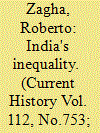

|
|
|
|
|
| Publication |
2013.
|
| Summary/Abstract |
"Inequality in India could be much more efficiently reduced through reforms that shrink the costly system of transfers, increase the role of markets in resource allocation, expand infrastructure investments, and improve the delivery of education and health care.
|
|
|
|
|
|
|
|
|
|
|
|
|
|
|
|
| 11 |
ID:
151619
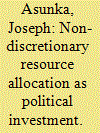

|
|
|
|
|
| Summary/Abstract |
When would politicians reduce or eliminate their own discretion in the distribution of valued benefits to voters? I argue that the answer lies in the extent of partisan attachments among voters: politicians would be more likely to adopt non-discretionary or self-binding resource allocation rules in contexts where voters evince weak attachment to political parties. Non-discretionary distributive rules allow politicians to reach unattached voters with benefits without angering their loyal supporters who might otherwise expect to be favoured. They also signal politicians’ commitment to unbiased distribution of public resources, which, research shows, attracts unattached voters. Analysis of data on allocations of legislators’ development funds in Ghana provides strong support for this argument. This result is robust to controls for alternative explanations and thus advances understanding of when politicians in new democracies would pursue reforms designed to reduce or eliminate political discretion.
|
|
|
|
|
|
|
|
|
|
|
|
|
|
|
|
| 12 |
ID:
069732


|
|
|
|
|
| Publication |
Santa Monica, Rand Corporation, 2002.
|
| Description |
xxiii, 108p.
|
| Standard Number |
0833031635
|
|
|
|
|
|
|
|
|
|
|
|
Copies: C:1/I:0,R:0,Q:0
Circulation
| Accession# | Call# | Current Location | Status | Policy | Location |
| 045890 | 359.332/HAR 045890 | Main | On Shelf | General | |
|
|
|
|
| 13 |
ID:
137598


|
|
|
|
|
| Summary/Abstract |
After more than three decades of rapid growth, China's economy is going through an important turning point, where structural imbalances in both supply and demand sides must be addressed for a more moderate and sustainable growth path. By focusing on the structural changes to its ownership, a central element in China's economic transformation under market reform, the present paper highlights the importance of private entrepreneurship in deepening market reform and, thereby, in driving economic growth in a more efficient and sustainable way. Based on a perspective of resource allocation and a conceptual framework of entrepreneurship, the paper elaborates on the evolution of the private sector and its performance in the context of ownership reform, making comparisons with the performance of the state sector. The analysis suggests that there is further room for more productive use of economic resources, especially capital, land and natural resources, by increasing the participation of private entrepreneurs in industries with high entry barriers in favor of state-owned enterprises. Moreover, more competitive and equal access to productive resources through reform is needed to promote more productive entrepreneurship and to reduce rent-seeking activities.
|
|
|
|
|
|
|
|
|
|
|
|
|
|
|
|
| 14 |
ID:
132776
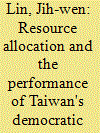

|
|
|
|
|
| Publication |
2014.
|
| Summary/Abstract |
Politics always involves the exchange of resources for votes, but the mechanism differs according to the electoral institution. The principal-agent model identifies two necessary conditions for this exchange to be feasible: (1) the opportunity cost of preferential grants is small, and (2) agents receiving these resources play a vital role in helping the principal to win. These conditions were satisfied in the presidential election of 2004, when swing voters were critical in helping the Democratic Progressive Party (DPP) to retain the presidency and limited costs were attached to the resources demanded by legislators elected under the single non-transferable vole (SNTV) system. After 2004, the president no longer exchanged grants for votes at the national level because swing voters could hardly change the result of presidential elections while the opportunity cost of grants was raised by the plurality-tier of the mixed-member majoritarian (MMM) system. Nevertheless, resource allocation still dominates local politics. After MMM was introduced, DPP legislators elected in DPP-led regions distributed the resources that were helpful to consolidating potential supporters; those campaigning in KMT-administered areas, however, attempted to lure swing voters by providing them with extra services-just like what their local heads did.
|
|
|
|
|
|
|
|
|
|
|
|
|
|
|
|
| 15 |
ID:
081021


|
|
|
|
|
| Publication |
London, Routledge, 2008.
|
| Description |
xix, 296p.
|
| Series |
Routledge/ECPR studies in European political science
|
| Standard Number |
9780415416719
|
|
|
|
|
|
|
|
|
|
|
|
Copies: C:1/I:0,R:0,Q:0
Circulation
| Accession# | Call# | Current Location | Status | Policy | Location |
| 053171 | 303.64/OBE 053171 | Main | On Shelf | General | |
|
|
|
|
| 16 |
ID:
104336


|
|
|
|
|
| Publication |
2011.
|
| Summary/Abstract |
In this work, we develop a game-theoretic model for whether and how a first mover should disclose her resource allocation. Our model allows us to explore whether the first mover should disclose correct information about her resource allocation, incorrect information, or no information. Although we study secrecy and deception specifically in the homeland-security context where the first mover is assumed to be the defender, our work can also provide insights in other contexts, such as business competition.
|
|
|
|
|
|
|
|
|
|
|
|
|
|
|
|
| 17 |
ID:
181466


|
|
|
|
|
| Summary/Abstract |
Analyzing the relationship between industrial resource allocation and carbon emissions from the regional level will promote cross-regional environmental coordinated governance. Based on the panel data of 30 provinces from 2007 to 2016, this paper explores the spatial distribution of industrial resource allocation, spatial autocorrelation of carbon emissions, and the relationship from a spatial econometric perspective. The results show that compared with other provinces, Jilin, Zhejiang, and Guangdong have relatively higher industrial resource allocation efficiency. The provinces with higher carbon emissions are spatially adjacent, and the provinces with lower carbon emissions are also spatially adjacent. On a national level, the improvement of industrial resource allocation can reduce carbon emissions. On a regional level, the impact of industrial resource allocation efficiency on carbon emissions is somewhat different. Industrial resource allocation can significantly reduce carbon emissions in the eastern region. However, it is not clear whether the improvement in the industrial resource allocation efficiency can reduce carbon emissions in the central, western, and northeast regions.
|
|
|
|
|
|
|
|
|
|
|
|
|
|
|
|
| 18 |
ID:
181467


|
|
|
|
|
| Summary/Abstract |
Analyzing the relationship between industrial resource allocation and carbon emissions from the regional level will promote cross-regional environmental coordinated governance. Based on the panel data of 30 provinces from 2007 to 2016, this paper explores the spatial distribution of industrial resource allocation, spatial autocorrelation of carbon emissions, and the relationship from a spatial econometric perspective. The results show that compared with other provinces, Jilin, Zhejiang, and Guangdong have relatively higher industrial resource allocation efficiency. The provinces with higher carbon emissions are spatially adjacent, and the provinces with lower carbon emissions are also spatially adjacent. On a national level, the improvement of industrial resource allocation can reduce carbon emissions. On a regional level, the impact of industrial resource allocation efficiency on carbon emissions is somewhat different. Industrial resource allocation can significantly reduce carbon emissions in the eastern region. However, it is not clear whether the improvement in the industrial resource allocation efficiency can reduce carbon emissions in the central, western, and northeast regions.
|
|
|
|
|
|
|
|
|
|
|
|
|
|
|
|
| 19 |
ID:
072890
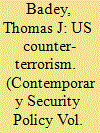

|
|
|
|
|
| Publication |
2006.
|
| Summary/Abstract |
Although both the Clinton and Bush administrations identified terrorism as a major national security threat, the Clinton administration focused on terrorism primarily as a law enforcement issue while the Bush administration approached terrorism as a military problem. This difference becomes readily apparent when the economic isolation, multilateral cooperation, resource allocation, and retaliation policies of both administrations are compared. Despite significant differences in their respective approaches to these policies, there has been a remarkable consistency in American counter-terrorism policy over the past decade. Fierce, partisan political debate has overshadowed these fundamental policy similarities. The development of American counter-terrorism policy after 9/11 was constrained by time factors as well as also institutional and political forces. Even in this, the most extreme challenge to American national security planning since the rise of the Cold War, bureaucratic institutions have proven themselves remarkably resilient.
|
|
|
|
|
|
|
|
|
|
|
|
|
|
|
|
|
|
|
|
|